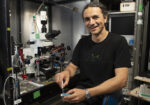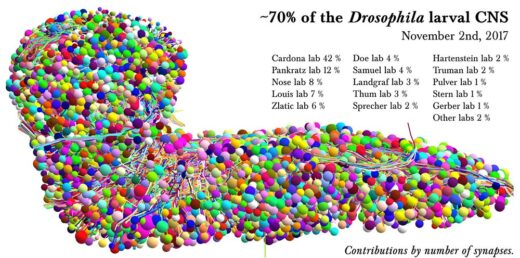

The brain works as an integrated whole. Animals interact with the world by combining inputs from their senses of vision, hearing, smell, taste, touch and multiple others, with memories of past experiences, to then select a single, appropriate motor response that we observe as behavior.

The study of each individual module of the brain revealed how signals are processed locally within. But the output of one module–say the retinas–are the inputs of another–say centres for coordinating the joint movement of body parts. To study how the brain is capable of choosing a specific behavioral response to the exclusion of all others, we must study both the internal circuits of a brain module and the signals that modules exchange with each other. In other words, we must observe the activity of all brain neurons on the basis of knowing the wiring diagram of the whole brain.
In the lab, we are mapping and analyzing the wiring diagram of the whole brain of a larval fruit fly (Drosophila). This established laboratory organism offers unmatched genetic tools to monitor and manipulate neuronal activity. And its reduced dimensions and numbers of neurons facilitate mapping, at the nanometer scale using electron microscopy, all connections among neurons (the synapses) to draw the wiring diagram of the whole brain. On the basis of the complete wiring diagram and the observation of both neuronal activity and animal behavior, we can then formulate theoretical models that capture the circuit dynamics and explain the rich behavioral repertoire of this animal, advancing our understanding of how the brain works as a whole.
Selected Papers
- Winding M, Pedigo BD, Barnes CL, Patsolic HG, Park Y, Kazimiers T, Fushiki A, Andrade IV, Khandelwal A, Valdes-Aleman J, Li F, Randel N, Barsotti E, Correia A, Fetter RD, Hartenstein V, Priebe CE, Vogelstein JT, Cardona A, Zlatic M. (2023)
The connectome of an insect brain.
Science 379(6636): eadd9330. - Valdes-Aleman J, Fetter RD, Sales EC, Heckman EL, Venkatasubramanian L, Doe CQ, Landgraf M, Cardona A, Zlatic M. (2021)
Comparative connectomics reveals how partner identity, location, and activity specify synaptic connectivity in Drosophila.
Neuron 109(1): p.105-22. - Eichler K, Li F, Litwin-Kumar A, Park Y, Andrade I, Schneider-Mizell CM, Saumweber T, Huser A, Eschbach C, Gerber B, Fetter RD, Truman JW, Priebe CE, Abbott LF, Thum AS, Zlatic M, Cardona A. (2017)
The complete connectome of a learning and memory centre in an insect brain.
Nature 548(7666): p.175. - Schneider-Mizell, C.M., Gerhard, S., Longair, M., Kazimiers, T., Li, F., Zwart, M.F., Champion, A., Midgley, F.M., Fetter, R.D., Saalfeld, S. and Cardona, A., (2016)
Quantitative neuroanatomy for connectomics in Drosophila.
Elife 5: p.e12059. - Ohyama, T., Schneider-Mizell, C.M., Fetter, R.D., Aleman, J.V., Franconville, R., Rivera-Alba, M., Mensh, B.D., Branson, K.M., Simpson, J.H., Truman, J.W., Cardona, A., Zlatic M. (2015)
A multilevel multimodal circuit enhances action selection in Drosophila.
Nature 520(7549): p.633.
Group Members
- Elizabeth Barsotti
- Senan Bottomley
- Jiaqi Chen
- Marc Corrales
- Ana Correia Da Silva
- Pedro Gomez Galvez
- Shi Yan Lee
- Laura Lungu
- Samia Mohinta
- Scott Wilson
- Yijie Yin